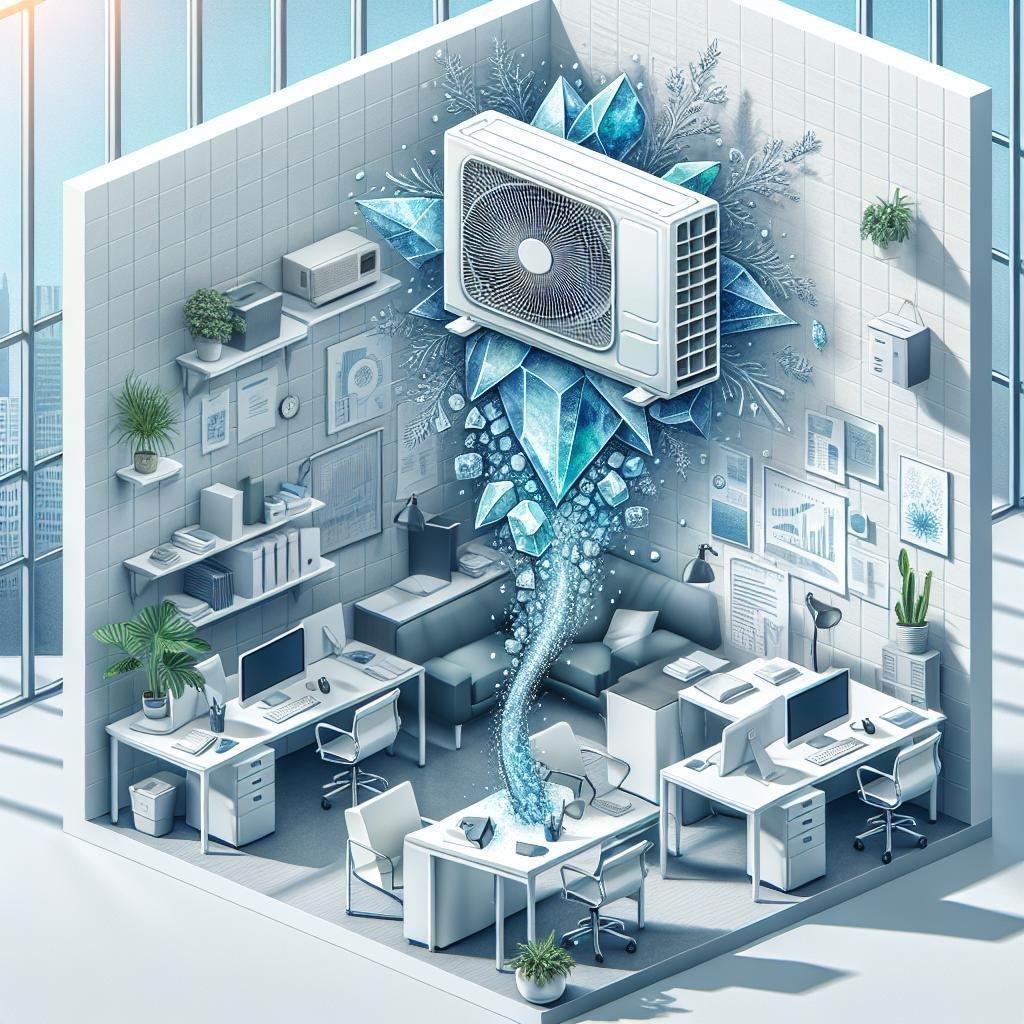As the sweltering summer heat approaches and the rhythmic hum of air conditioning fills the office, the comfort of a well-maintained mini split AC system ofen remains an unsung hero in our daily productivity. These compact, efficient units provide not onyl relief from the rising temperatures but also contribute to a harmonious working environment. However, like any elegant piece of equipment, mini split systems require a bit of tender care and attention to operate at their best.In this article, we will explore the best practices for maintaining mini split AC systems in office settings, ensuring they run smoothly, efficiently, and effectively throughout the seasons. Whether you’re an office manager overseeing multiple units or an employee looking to improve your workspace, these essential tips will help you keep your cool and enjoy a agreeable atmosphere year-round.
Essential Maintenance Tips for Optimal Mini Split Performance
To ensure the longevity and efficiency of your mini split AC system, regular maintenance is paramount. Start by cleaning or replacing the air filters every one to three months, as clogged filters can significantly impair airflow and reduce cooling efficiency. Additionally, keep the outdoor unit free from debris such as leaves, dirt, and branches, as these can obstruct airflow and hinder performance. regularly check the drain line for blockages to prevent water buildup, which can lead to mold growth and system malfunctions.
Another significant aspect of maintenance is to schedule annual professional servicing. Technicians can perform thorough checks and cleanings that go beyond what is practical for regular users. They will inspect and calibrate the refrigerant levels, ensuring optimal cooling capacity while minimizing energy consumption. Consider creating a simple maintenance checklist for your staff to promote accountability and regular upkeep:
| Task | Frequency | Responsible Party |
|---|---|---|
| Clean/replace air filters | 1-3 months | Office Manager |
| Clear debris from outdoor unit | Monthly | Facilities Staff |
| Check drain line | Monthly | Facilities Staff |
| Schedule professional service | Annually | Office Manager |

Understanding Filtration and Airflow in Office Environments
In the context of office environments, effective filtration and airflow are crucial components that contribute to the overall efficiency of mini split AC systems. The quality of air in the workspace directly affects employee productivity and health. To ensure optimal air circulation, consider the following best practices:
- Regular Filter Maintenance: Clean or replace filters monthly to prevent dust and allergens from circulating.
- Airflow Pathway Clearance: Keep all vents and air returns unobstructed to enhance air movement throughout the office.
- Humidity Control: Monitor humidity levels, as effective dehumidification aids air quality and reduces strain on the system.
Additionally, understanding the dynamics of airflow can lead to more efficient energy usage in the office. A well-maintained mini split AC not only promotes a comfortable work environment but can also reduce energy costs. For quick reference,here’s a simple overview of how filtration impacts airflow:
| Filter Type | Impact on Airflow | Recommended Change Frequency |
|---|---|---|
| HEPA | High filtration,lower airflow | Every 6 months |
| Electrostatic | Moderate filtration,balanced airflow | Every 3 months |
| Fiberglass | Low filtration,high airflow | Every month |
Signs of Wear and When to Call a Professional
Recognizing the signs of wear in your mini split AC unit is crucial in maintaining optimal performance. Look out for increased noise levels, such as grinding or rattling sounds, which can indicate loose components. additionally, observe for reduced cooling efficiency; if your system is struggling to cool the office, it may be time to investigate further. other signs to consider include unpleasant odors, which may signal mold or mildew growth in the indoor unit, and leaking water, indicating a potential internal blockage or a failing component.
If you identify any of these issues, it’s essential to evaluate whether they require professional attention. Minor cleaning tasks, such as replacing filters or cleaning dust from the outdoor unit, can typically be handled in-house. However, for more complex problems, such as refrigerant leaks or faulty electrical components, contacting a qualified technician is advisable. Remember, addressing these issues promptly can prevent further damage and prolong the lifespan of your mini split AC system. Here’s a quick reference table to help you decide:
| Sign of Wear | Action Required |
|---|---|
| Increased noise levels | Call a professional |
| Reduced cooling efficiency | Inspect filters, call if persists |
| Odors | Clean unit, call if persists |
| Water leaks | Call a professional |

The Importance of Seasonal Check-Ups for Longevity and Efficiency
Seasonal check-ups are pivotal in ensuring that mini split AC systems in offices not only achieve maximum efficiency but also extend their lifespan.Regular maintenance provides an chance to catch any potential issues early, helping to prevent costly repairs down the line. By scheduling these check-ups,companies can ensure that their systems are operating at peak performance,which in turn results in lower energy consumption and reduced utility bills. Key benefits of seasonal evaluations include:
- Enhanced Air Quality: Routine cleaning reduces allergens and dust build-up.
- Increased Energy Efficiency: A well-maintained system consumes less energy, benefiting both the environment and the budget.
- Prolonged Equipment Life: Regular inspections and timely repairs can significantly extend the lifespan of the unit.
Moreover, having a consistent check-up routine establishes a benchmark for performance, allowing for better forecasting of operational costs and the identification of patterns that may necessitate larger maintenance interventions. It’s advisable to work wiht professional HVAC technicians who can conduct thorough inspections, including the cleaning of coils, checking refrigerant levels, and ensuring all components are functioning correctly. consider utilizing the following table to outline a regular check-up schedule:
| Check-Up Frequency | Recommended Actions | Expected Benefits |
|---|---|---|
| Seasonally (Spring & Fall) | Full system inspection, filter replacement, coil cleaning | Optimal performance, lower energy bills |
| Monthly | Filter checks and changes as needed | Improved air quality and efficiency |
| Annually | Comprehensive system maintenance | Prolonged life of the AC unit |
Q&A
Q&A: Best Practices for Maintaining Mini Split AC Systems in Offices
Q1: What is a mini split AC system, and how does it differ from traditional air conditioning?
A1: A mini split AC system is a type of ductless air conditioning that consists of an outdoor compressor and one or more indoor air-handling units. Unlike traditional systems that rely on ductwork to circulate air, mini splits are more flexible, allowing for zoned temperature control in different areas of the office. This not only enhances comfort but can also improve energy efficiency since you can cool specific areas as needed.
Q2: Why is regular maintenance critically important for mini split AC systems in an office environment?
A2: Regular maintenance is crucial for several reasons.First, it helps ensure optimal performance and efficiency, reducing energy bills and extending the lifespan of the system. second, proper upkeep can prevent unexpected breakdowns, which could disrupt office operations. Lastly, it helps maintain good air quality by keeping filters and components clean, thereby promoting a healthier workplace.
Q3: What are some essential maintenance tasks that should be done on a mini split AC system?
A3: Essential maintenance tasks include cleaning or replacing the air filters every few months, checking and cleaning the indoor unit’s coils, and ensuring that the outdoor unit is free of debris such as leaves or dirt. Additionally, inspecting the condensate drain for blockages and checking the refrigerant levels can help prevent operational issues.
Q4: How often should mini split AC systems be serviced by a professional?
A4: Ideally, a professional should service mini split AC systems at least once a year. This annual tune-up can involve a thorough inspection and cleaning of components to ensure everything is functioning correctly. If your office environment generates a lot of dust or if the system is in constant use, biannual servicing may be beneficial.
Q5: What signs indicate that a mini split AC system may need immediate attention?
A5: Signs that may indicate a need for immediate attention include unusual noises, reduced cooling efficiency, bad odors emanating from the unit, and moisture or leaks around the indoor unit. If you notice any of these issues, it’s best to consult a professional to diagnose the problem and avoid further damage.
Q6: Can offices perform any DIY maintenance on their mini split AC systems?
A6: Absolutely! Offices can take some simple steps for DIY maintenance. Cleaning or replacing air filters, removing dust from the indoor unit’s air intake grilles, and keeping the outdoor unit clear of debris are all manageable tasks. However, for any deeper maintenance or repairs, it’s wise to contact a certified technician.
Q7: Are there any energy-saving tips to keep in mind while using mini split AC systems?
A7: yes! To enhance energy savings, consider setting the thermostat to a higher temperature during non-peak hours or using a programmable thermostat for more precise control. Keeping blinds or curtains closed during hot daylight hours can reduce the workload on the unit,while regular maintenance ensures the system operates at peak efficiency.
Q8: How can offices foster a culture of proper mini split AC maintenance among staff?
A8: Offices can foster a culture of maintenance by educating staff about the importance of proper usage and upkeep of the mini split AC systems. Regular reminders to check filters, keeping workspace areas clear of obstructions, and encouraging open dialog about any noticeable issues can empower everyone to contribute towards a comfortable and efficient working environment.By adhering to these best practices, offices can not only enhance the performance of their mini split AC systems but also contribute to a more comfortable and productive workplace.
Future Outlook
ensuring the optimal performance and longevity of mini split AC systems in office environments is not only about comfort but also about fostering a productive work atmosphere. By adhering to these best practices—regular maintenance, thorough cleaning, and timely professional servicing—you can create a more efficient climate control system that contributes to employee satisfaction and overall energy efficiency. As you navigate the nuances of temperature management within your workspace, remember that a little proactive care goes a long way. reward your team with a pleasant indoor climate, and they will reciprocate with increased focus and productivity.with the right approach, your mini split AC system can serve as a silent partner in your office’s success. Stay cool, stay productive!

